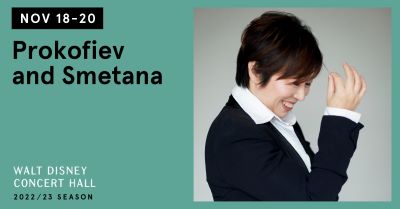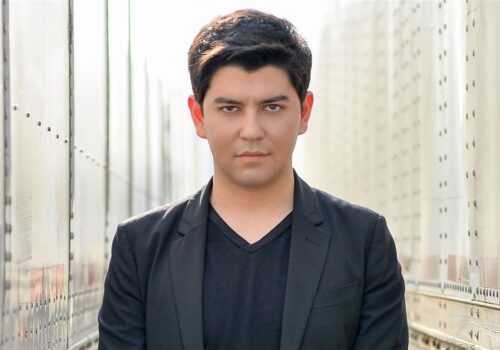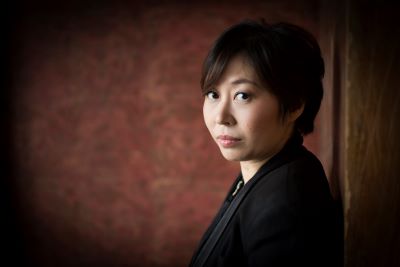A FLABBERGASTING PERFORMANCE
FROM ABDURAIMOV
Is it possible that the great pianist Behzod Abduraimov has ten hands? Watching him last Sunday at Disney Hall performing Prokofiev’s Piano Concerto No. 2 was so electrifying that it wasn’t until after the work that I wondered if I ever saw his hands in anything other than a blur. (And somehow at 32 he looks taller than in previous performances.) Composed in 1912, the original version of the concerto was lost during the Russian Revolution, but Prokofiev rewrote it from memory and the work finally got its premiere in 1924, with Prokofiev performing the solo part. How thrilling to watch Abduraimov in a white-knuckle, pulsating performance of a notoriously demanding piano score with so many rhythmic challenges. His playing was full of attack where required, but also sincere and emotional in the concerto’s more tranquil passages. Instead of showing off, he was warm, conversational, and fresh when necessary. It was 100% virtuosic, and I tell you his hands were moving so fast that they looked like the flickering of a silent movie. But even with centrifugal-force speed the attention to detail was crisp. There wasn’t a moment when you couldn’t hear the work’s dazzling personality streaming through his playing.
Guest conductor Xian Zhang led the Los Angeles Philharmonic with her trademark sharp effusiveness. The Music Director of the New Jersey Symphony proved why she is in such demand. She truly was a joy to watch: Extraordinarily passionate, she cut the air like a mechanical cuckoo clock yet provided incredibly warm sounds throughout the evening.
Her interchange with the orchestra was another stunning achievement, given the difficult task of balancing Prokofiev’s impressionism with the work’s technical challenges. The appearance of effortlessness on Abduraimov’s part was amazing, and Zhang did a praiseworthy job of making sure the stunning pianist was heard at all times — even the very few subtler passages were heard by Abduraimov over the orchestra. Above all, he found heart in music which is mostly solo pyrotechnics and showy brilliance. It was fitting that his encore was Tchaikovsky’s miniature “Neapolitan Song” (from Children’s Album) as it’s played comodo, or at a relaxed pace.
The program began with Qigang Chen‘s L’Éloignement, a 15-minute work for 34 strings, first heard at Shanghai’s International Arts Festival in 2003. The composer wrote that L’Éloignement — laid out as a rondo with variations — depicts separation, disorder, imagination, and yearning. The music is both happy and sad, nostalgic and exciting, all of which account for the conflicting moods of the departing one. Using Western classical music techniques with Chinese folk tunes, the flavor was filmic, somewhat a cross between Tan Dun and Bernard Herrmann. So imagine the thrill of violins hitting the strings like Psycho but with the timbre, breath and atmosphere of Crouching Tiger, Hidden Dragon. The strings, meticulously and flowingly conducted, went from kinetic energy to isolation to propulsive scherzos. What a great thing to see the bass section go for broke with manically difficult sixteenth notes. We also got to see Martin Chalifour on violin and Robert deMaine on cello doing splendid soloing with Chen’s usage of a folk song from Northwest China. While perhaps a mite repetitious, the piece is exquisite and ravishing.
Closing the event were three of the the six symphonic poems that make up Czech composer Bedřich Smetana‘s Má vlast (My Country), written over a period of years, even while he was going deaf. The highlights are here, including, of course, Vltava, (or Die Moldau, to give it its more familiar name), his depiction of the river that flows through Prague. Here, Smetana is at his best, tuneful, original and full of evocations of his country. Šárka, named after a female warrior, highlighted Boris Allakhverdyan‘s rich solo clarinet (which, as part of the story, brings to life some men as they drink a toxic mead!). The final, Blaník, refers to the mountain with the same name, which legend says that an army of knights, led by St. Wenceslas, slept there. All areas of the orchestra were utilized, with the winds leading on some of the most serene moments of the movement (LA Phil’s newest Principal Clarinetist Marc Lachat sounded positively enchanting). Smetana intertwines the horns here too, as well as using them for representing war and heroism. A triumphant end to a triumphant program.
Prokofiev and Smatana
LA Phil
Xian Zhang, conductor; Behzod Abduraimov, piano
reviewed November 20, 2022
for more info, visit LA Phil



